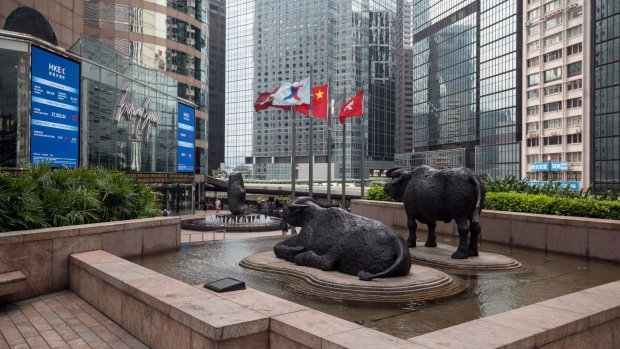Jul 20, 2020
Hong Kong Exchanges Soars on Ant’s Dual Listing With Shanghai
, Bloomberg News

(Bloomberg) -- Hong Kong Exchanges & Clearing Ltd. surged as much as 6.2%, its biggest jump in 20 months, after billionaire Jack Ma’s Ant Group announced plans to seek a dual listing in Hong Kong and Shanghai, bypassing New York.
Ant Group is seeking a valuation of more than $200 billion as it goes public, and could raise more than Saudi Aramco’s record $29 billion if market conditions are favorable, according to a person familiar with the matter. The Hong Kong portion could raise about $10 billion, according to people familiar with the matter.
The listing is a boost to exchanges in Hong Kong and Shanghai, while dealing a blow to U.S. bourses as more Chinese firms look to raise money closer to home amid rising U.S.-China tensions. Hong Kong-listed Semiconductor Manufacturing International Corp. raised $7.5 billion from a Shanghai share sale in July, while Chinese internet firms JD.com Inc. and NetEase Inc. added secondary listings in Hong Kong this year.
Ant’s IPO is also a major lift for the city of Hong Kong, which is facing mounting challenges from a sharp recession, political turmoil from year-long protests and a new national security law that has prompted concerns about an exodus from the financial hub.
“Ant Group’s listing in Hong Kong will be a vote of confidence in the city,” according to Bruce Pang, head of macro research at China Renaissance Securities Hong Kong.
Hong Kong Exchange Chief Executive Officer Charles Li said Ant Group’s “intention to IPO in Hong Kong, as well as in their home market, affirms Hong Kong’s role as the world’s leading international IPO market.”
Index company Hang Seng Indexes Co. also announced plans to launch a new technology index effective July 27. Citigroup Inc. said in a research note that the index will attract investors to local tech shares and facilitate index-linked funds and derivatives, while attracting more high-quality Chinese tech companies to Hong Kong.
Hong Kong Exchanges rose 6% to HK$366.60 at 10:30 a.m. The stock has surged 45% this year, the third-best performer on the Hang Seng Index, which has dropped 9.7% in 2020.
©2020 Bloomberg L.P.





